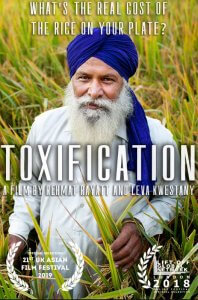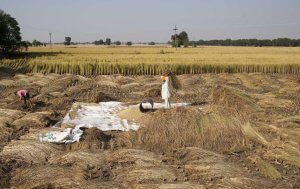 One of the core missions of I Am Hip Hop is to raise the awareness of serious global issues through art. Last month, we had the experience of just that, as we attended the London première of “Toxification”. The showing was at Ernest & Young’s office in London Bridge and we were eager view this film as we knew the aim was to focus on the growing crisis that farmers from the Punjab region of India face.
One of the core missions of I Am Hip Hop is to raise the awareness of serious global issues through art. Last month, we had the experience of just that, as we attended the London première of “Toxification”. The showing was at Ernest & Young’s office in London Bridge and we were eager view this film as we knew the aim was to focus on the growing crisis that farmers from the Punjab region of India face.
The screening was followed by a Q&A with, Rehmat Rayatt who co-produced the documentary over the span of two years, which included filming in Punjab and post editing in the UK. Rehmat, like many other British Punjabis, has a deep connection with her heritage, which is often romanticised in the folklore that is showcased in the media and folklore in the United Kingdom.
Punjab itself takes its name from Persian, meaning five waters, for the five rivers that flow through the region. These rivers gave the land an abundance of green, irrigated fields, which enabled it to become the “bread basket” of India for its strong cultivation of crops over the centuries. India produces 103 million tonnes of the world’s rice and Punjab is the state with the third highest production in the country. This is a feat that has been attained by a traditional farming culture and the “The Green Revolution”. It is however, the latter of these, which has helped cause a massive shift in the sustainability of Punjab’s crop production since the 1960s.
Toxification, first hand explores how this “revolution” not only destroyed the organic farming industry but also destroyed the lives of thousands of farmers in Punjab. India adopted multinational systems of synthetic technologies such as pesticides, fertilisers and machinery so that it can produce for the global, mass market. However, these methods have now put increased pressure on the natural resources of the land and in turn, the farmers, who are now in debt to the corporations controlling the industry. Over 1000 farmers in Punjab have committed suicide per year in the last decade and a half, due to their struggles. In this movie, some of those that are still surviving directly tell us of the link between our global food industry and the destruction of communities in a historically prosperous land.
Toxification: Gurpartap’s Story from Rehmat Rayatt on Vimeo.
The project explores the connection between the land, what we consume, and our mental health in a hard-hitting manner, with frontline footage of the processes and emotional monologues from those most affected. Elderly farmers Amarjit Singh and Balbir Singh emotionally share their hardships of waking up before dawn every single day to endure the industry demands set to them, so that they can afford to feed their families. Ironically, they share that they wouldn’t even feed these crops they grow to their own kids as it consists of so many chemicals. These crops are traded by brokers who sell it nationally and internationally, there is no going back for these farmers as they feel that they wouldn’t be able to meet the demands by switching to traditional, organic methods. The only way out for their counterparts was to commit suicide, in the hope that their families will receive compensation from the government.
Many of farmers still surviving are practically living in an upright coma as they have become addicted to strong opiate-based drugs to cope with their physical and mental torment. The film states that 73.5% of Punjab’s youth are now addicted to drugs, with many of the workers unable to function on the fields without a hit.
Despite the struggles that are captured, the producers also manage to portray solutions and hope for the future of this environment. Gurpartap Singh Pannu is a reformer drug addict who is now a director at a local rehabilitation centre called The Hermitage, which was founded by Dr JPS Bhatia. The institution highly vocalises the need for the education between all parties involved about progressive farming methods and offers a plea for awareness to be spread to help the growth.

Darshan Singh Rudel, a French immigrant to the Punjab, shows us one of the few organic farms in the area, which he founded himself. With rice being one of the biggest cash crops for the region, water is being used in excess to maintain the standards set for the thirsty yield. Rudely, however, sets an example of how there is still value in organic farming by producing sustainably while maintaining a healthy living.
Toxification is the film that is most needed in this time of environmental uncertainty, especially with movements such as “Extinction Rebellion” campaigning across the country. The documentary is a real eye opener and it inspired everyone at the London screening to think about how to make a positive impact on the dire situation. With the world more connected than ever via smart technology, we are just also as connected through the food that we eat. This documentary shows that the small choices we make can have an impact thousands of miles away across the globe.
The producers are looking to host more screenings around the country this year, following their positive feedback at the UK Asian Film Festival. For more information on this must-see documentary, please visit follow Toxification on Instagram (https://www.instagram.com/toxificationdoc/) or visit www.toxification.com.
Photography by Rehmat Rayatt
Sumit Singh
Latest posts by Sumit Singh (see all)
- REVIEW | EARTHGANG HOPE FOR ‘NO MORE BAD KARMA’ WITH THEIR VIBRANT PERFORMANCES — October 8, 2019
- REVIEW| EMOTIONAL ORANGES (@emotionalorange) BRING THEIR ENIGMATIC GROOVE TO LONDON’S XOYO — June 10, 2019
- FILM REVIEW| ‘TOXIFICATION’ HIGHLIGHTS THE DISTURBING TRUTH BEHIND OUR FOOD THAT COME FROM THE BIGGEST PESTICIDE MARKET IN ASIA — April 30, 2019
